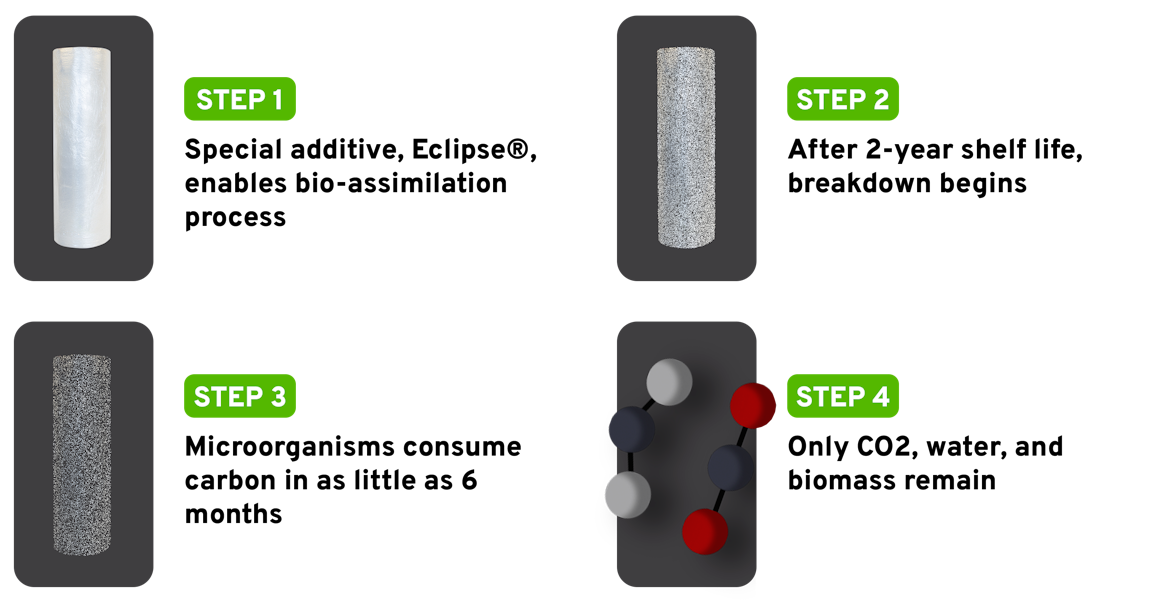Bio-assimilation explained: The science behind Precisionrap DK
In recent years, various stretch films have been marketed as "compostable" or "biodegradable," promising to address environmental concerns. However, these options often fall short of their eco-friendly claims.
Many biodegradable films require industrial composting facilities to break down, which are not widely accessible in many regions. Others may degrade naturally, but this process often results in microplastics that pose a threat to wildlife, marine life, and even human health.
Bio-assimilation technology represents a groundbreaking solution to the global plastic crisis, and Precisionrap DK is at the forefront of this innovation.
This revolutionary stretch film offers a sustainable alternative to traditional plastic films, combining superior performance with environmental responsibility.
But what exactly is bio-assimilation and what does it mean for businesses looking to reduce their environmental impact?
In this article, we explore all you need to know about bio-assimilation and how it is transforming the packaging industry.
What is bio-assimilation?
Bio-assimilation is the final stage of plastic biodegradation, where the material breaks down to a molecular weight that can be consumed by living organisms. Unlike traditional biodegradable or compostable plastics, bio-assimilable materials degrade completely into harmless components, leaving no microplastics or toxic residues behind. This innovative process represents a truly sustainable solution to the plastic waste crisis.
How does bio-assimilation work?
Bio-assimilation works through a multi-step process:
- Controlled degradation: The process is engineered to begin only after a predetermined period, typically around two years, ensuring the material maintains its protective properties during its intended use.
- Molecular breakdown: Once the predetermined period is over, the plastic's molecular structure begins to break down to a weight that can be consumed by living organisms. This is often catalysed by the inclusion of specific transition metals in the plastic formulation, which act as catalysts to break the carbon-to-carbon bonds within the polymer molecules.
- Microbial consumption: Microorganisms grow as colonies on the plastic surface, adhering to it with thin appendages. These appendages secrete plastic-degrading enzymes, enabling the microorganisms to consume the broken-down polymers.
- Complete biodegradation: The material degrades entirely into biomass, water, and a small amount of carbon dioxide. This process can occur in diverse settings, including terrestrial, aquatic, and even anaerobic landfills, without requiring special conditions like oxygen or sunlight.

How bio-assimilation works with Precisionrap DK
Precisionrap DK utilises an innovative bio-assimilation technology that allows the stretch film to break down completely after its useful life, leaving no harmful residues behind. Here's how the process works:
- Additive integration: Precisionrap DK contains a special additive package called Eclipse® that triggers the bio-assimilation process.
- Stable shelf life: The film maintains a stable shelf life of two years, ensuring it remains effective for its intended use.
- Chemical reaction initiation: Once the stable period ends, a chemical reaction begins, causing the film to break down at the molecular level.
- Microbial attraction: The breakdown process attracts microorganisms that "eat" the carbon in the film.
- Colony growth: These microorganisms form colonies that thrive and grow exponentially, consuming the film as their food source.
- Complete biodegradation: The process continues until the entire film is consumed, leaving behind only carbon dioxide, water, and biomass (microbial remains).
- Adaptable timeline: Depending on environmental conditions, the bio-assimilation process can take anywhere from 6 months to 2 years.
- Environmental versatility: This transformation occurs in various environments, including those with abundant UV rays, microorganisms, and heat, as well as in oceans or landfills.
- No negative impact: If Precisionrap DK is introduced into the recycling stream before bio-assimilation begins, it does not negatively impact the recycling process.

By employing this bio-assimilation technology, Precisionrap DK offers a sustainable solution that maintains the performance of traditional stretch films while addressing end-of-life environmental concerns. This innovative approach ensures that even if the
film escapes the recycling system, it will naturally break down without leaving behind microplastics or other harmful residues.

Interested in hearing more about Precisionrap DK?
Contact our team at Swiftpak today. We'll talk you through the many benefits of using Precisionrap DK and are always happy to answer any questions you may have.
Looking for a truly sustainable stretch film backed by science?
Look no further. Precisionrap DK is a revolutionary bio-assimilable stretch film that combines superior performance with complete biodegradability. FDA-approved and tested to ASTM standards, Precisionrap DK can help businesses achieve their sustainability goals with zero compromise.
For more information on Precisionrap DK, contact our expert team today. We’re always happy to answer any questions and provide guidance on what is best for your packaging needs.